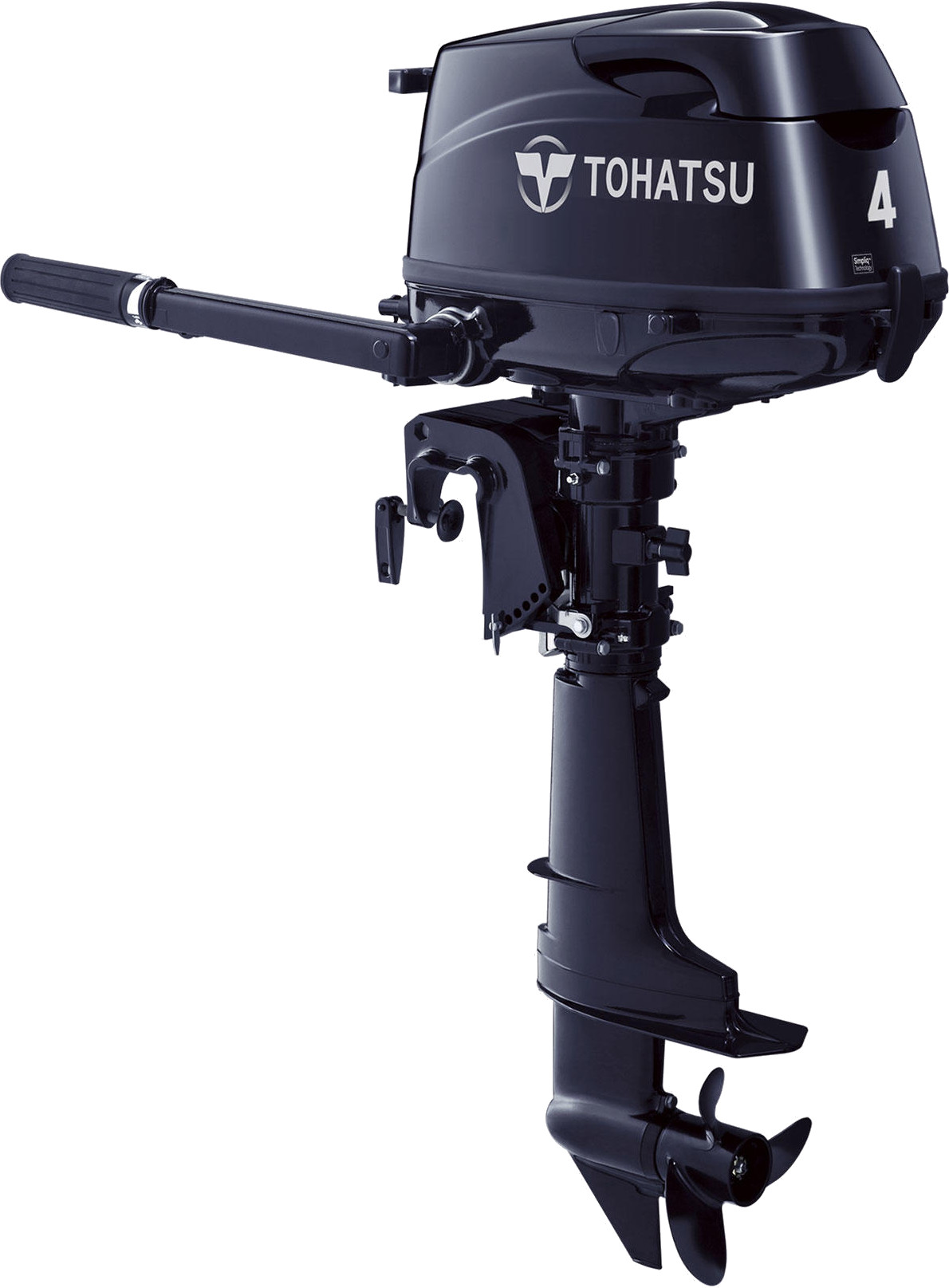Choosing a 4 HP outboard
Like its 5 HP and 6 HP siblings, just not as much

I’ve ranked this class of outboard according to their manufacturers’ specs.
The latest models of the 4 HP outboards are flexible, low-cost, and capable of pushing a 1500 lb displacement hull to speed. A 4 HP outboard is also a practical, inexpensive way to shuttle your tender to and from shore. But for a planing hull, a 4 HP doesn’t have the guts. Likewise, if you need to travel greater distances, consider getting something bigger or make sure it has a connector for external fuel.
Contents
- Compared to electric
- Compared to 2.5 HP
- Compared to 5 HP and 6 HP
- Yamaha F4
- Suzuki DF4A
- Tohatsu MFS4
- Mercury 4 HP
- More small outboards
Compared to electric
As far as usage, 4 HP outboards weigh more but have more range on a single tank compared to an equivalent electric outboard. Electrics typically come with a full range of transom lengths, too, from 15 to 25 inches.
Compared to 2.5 HP
The 4 HP outboards can’t beat their 2.5 HP siblings on price and weight. I can’t carry a 4 HP with one hand. But for the extra cost and weight of a 4 HP, you get more features:
- Fuel flexibility: All except the Suzuki have both an internal tank and a connector for an external tank. The internal tanks are all about the same size, differing by a cup’s worth of fuel. One cup of fuel is about an 15-20 minutes of mid-throttle running time. The external tank is an extra cost.
- Transmission: Forward, neutral, and reverse. With reverse, a 4 HP turns only 170-180 degrees instead of the full 360 that you can do with a 2.5 HP.
- More transom options: Most 4 HP outboards come in shaft lengths of either 15 and 20 inch models.
- Battery charging: An alternator is an option for all brands except Mercury. Keep in mind that manufacturers rate alternators only at full throttle. Don’t expect to top up your battery bank by idling a 4 HP outboard while brushing your teeth before going to bed.
Compared to 5 HP and 6 HP
The funny thing about the 4 HP outboards are their “bigger” siblings, the 5 HP and 6 HP models.
For all manufacturers, the 4 HP model is a detuned 5 HP or 6 HP outboard. Except for power output, they are identical, with the same transmission, engine displacement, weight, and fuel capacities.
In other words, the only practical advantage the 4 HP has is its lower price. If you’d rather have more power with no weight gain, spend the extra cash for the 5 HP or 6 HP model. They are the same engine otherwise.
Yamaha F4

Shaft length (inches): 15, 20
Weight (lbs/kg): 15 inch: 59/27, 20 inch: 61/28
Internal fuel capacity (US gal/litres): 0.3/1.1
Transmission: forward, neutral, reverse
Starting: manual pull
Alternator: 12V 6A
Carrying handles: front and rear
Storage/transportation: upright, front, starboard, port
Warranty (years): 3
The Yamaha F4 has the best mix of features inlcuding decent internal fuel capacity, storage on 3 sides without leaking oil or fuel, and front and rear handles.
Suzuki DF4A

Shaft length (inches): 15
Weight (lbs/kg): 55/24
Internal fuel capacity (US gal/litres): 0.26/1
Transmission: forward, neutral, reverse
Starting: manual pull
Alternator: 12V 5A (optional)
Carrying handles: front and rear
Storage/transportation: upright, front, starboard, port
Warranty (years): 5
The Suzuki 4 HP beats everyone else on weight at 55 lbs. It’s available only in 15 inches. For 20 inches, see the Suzuki 6 HP. Like Yamaha, it allows storage on 3 of its 4 sides.
Unlike its competitors, the Suzuki doesn’t have a connector for external fuel. You’ll have to get the 6 HP for this.
Tohatsu MFS4

Shaft length (inches): 15, 20
Weight (lbs/kg): 15 inch: 57/26, 20 inch: 59/27
Internal fuel capacity (US gal/litres): 0.3/1.3
Transmission: forward, neutral, reverse
Starting: manual pull
Alternator: 12V 5A (optional)
Carrying handles: front and rear
Storage/transportation: upright, front, starboard, port
Warranty (years): 5
The Tohatsu has a shifter at the front of the engine instead of its side. The 4 HP has an internal fuel tank which is absent on the Tohatsu 5 HP.
Tohatsu also offers a 3.5 HP. It has the same specs as the Tohatsu 2.5 HP models. The 3.5 HP is lighter and less expensive, but it doesn’t have an external tank connection and has no options for an alternator or propellor choice.
Mercury 4 HP

Shaft length (inches): 15, 20
Weight (lbs/kg): 15 inch: 57/26, 20 inch: 59/27
Internal fuel capacity (US gal/litres): 0.3/1.1
Transmission: forward, neutral, reverse
Starting: manual pull
Alternator: no
Carrying handles: front
Warranty (years): 3
The Mercury is the only 4 HP outboard without an alternator option.
Like Tohatsu, Mercury also offers a 3.5 HP. But this outboard shares the base with the Mercury 2.5 HP model. The 3.5 HP is lighter and less expensive than the 4 HP, but it doesn’t have an external tank connection.
More small outboards
Guide: Choosing a small outboard
Choosing an outboard engine for your small sailboat
Choosing a 2.5 HP outboard
These gasoline outboards are the tiniest, including the price
Choosing a 5 HP or 6 HP outboard
Some are specialized for sailboats
Choosing an electric outboard
Maybe electric outboards aren’t just for occasional use or short trips
At your service
Humbly yours,
Marc, Supreme Purser